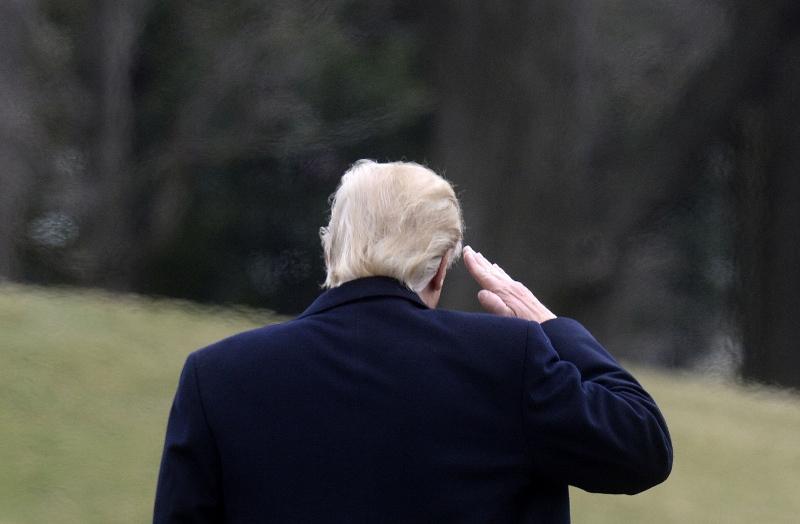Objectively Assessing Trump’s First Three Weeks
A view of Donald Trump’s reign, with input from PFHS students
Photo by: TNS
US President Donald Trump salutes as he walks toward Marine One as he departs the White House on Feb. 3, 2017 in Washington, D.C. Photo by Olivier Douliery/Abaca Press/TNS)
With each passing day of Donald Trump’s Presidency, America’s divide continues to widen. Whether it be controversial nominations, a so-called ‘Muslim ban,’ or actually ordering that a wall be built, Trump is staying true to most of his campaign promises. This has prompted outcry from various demographic groups across the country, whether it be the Women’s March on the capital or the multicultural rallies at airports across the nation against this seven-nation ban. One way people have taken to protesting is to tweet the hashtag #NotMyPresident. This has sparked outcry from both moderates and conservatives.
“I think the hashtag is stupid because [Trump] quite literally is your president if you’re [an American] citizen,” said senior moderate Karis Roberts.
Some didn’t just point out the stupidity in the hashtag, but also went on the offensive.
“If you’re an American citizen, he’s your president. Deal with it and stop whining,” said senior conservative Josh Wattawa.
Soon thereafter, on Jan. 27 Trump unveiled his travel ban against seven Muslim-majority countries, sparking outrage and chaps, as the Department of Homeland Security had no prior knowledge of this or any directives on how to handle the situation at airports. Incoming refugees and green-card holders were detained. Trump used the seven countries former President Obama had marked as ‘countries of concern,’ yet no American deaths have been caused by citizens from any of these countries, according to Politifact.com. That doesn’t seem to matter to some hardline-conservatives.
“The primary job of our government is to secure the safety of its citizens. If the days that the ban is in place are used for the purpose of identifying and stopping future acts of terror, I stand by it,” said Wattawa.
However, not all Republicans agree with the ban, especially if it affects people in their demographic group.
“The ban has had a negative toll on innocent people who were traveling that day. Terrorism can be controlled without banning certain people,” said junior Tayseer Hassan, a right-leaning Muslim.
This ban is currently in limbo in the court system, after a 3-0 ruling that the travel ban was unconstitutional. The White House is currently considering appealing, but may wait until a successful Supreme Court justice nomination.
On the topic of the judiciary, arguably one of the most important duties Trump has attempted to accomplish in his first 100 days has been to appoint a new Supreme Court Justice in the wake of Justice Anton Scalia’s death. Trump nominated Neil Gorsuch, who is currently a judge on the United States 10th Circuit Appeals Court. Gorsuch is very similar to Scalia, often having similar interpretations of the law as Scalia did, including an often strict interpretation of the Constitution. People tend to be willing to approve of Gorsuch, as he is a very experienced candidate.
“He has a really good track record. He’s a smart guy, I mean, he went to Harvard, Columbia, and Oxford,” said Roberts.
Most conservatives are elated by his nomination, as it ensures around 30 more years of a Scalia-like presence on the Supreme Court.
“I believe Gorsuch is going to bring the same conservative perspective and intellectual superiority lost with the death of [Anton] Scalia [to the Supreme Court]. I believe it was a strong nomination by Trump,” said Wattawa.
Overall, while Trump has done some rather unconventional things and passed numerous executive orders to enforce his agenda, he has met the basic requirements of being President thus far.


